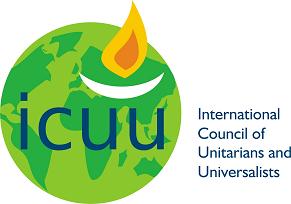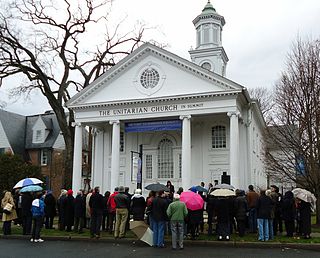Related Research Articles

The Canadian Unitarian Council (CUC) is a liberal religious association of Unitarian and Unitarian Universalist congregations in Canada. It was formed on May 14, 1961, initially to be the national organization for Canadians belonging to the Unitarian Universalist Association (UUA) which formed a day later on May 15, 1961. Between 1961 and 2002, almost all member congregations of the CUC were also members of the UUA and most services to congregations in Canada were provided by the UUA. However, in 2002, the CUC formally became a separate entity from the UUA, although the UUA continues to provide ministerial settlement services. Some Canadian congregations have continued to be members of both the CUC and the UUA, while most congregations are only members of the CUC.

The International Council of Unitarians and Universalists (ICUU) was an umbrella organization founded in 1995 comprising many Unitarian, Universalist, and Unitarian Universalist organizations. It was dissolved in 2021 along with the Unitarian Universalist Partner Church Council to make way for a new merged entity. Some groups represented only a few hundred people; while the largest, the Unitarian Universalist Association, had more than 160,000 members as of May 2011—including over 150,000 in the United States.

Unitarian Universalist Association (UUA) is a liberal religious association of Unitarian Universalist congregations. It was formed in 1961 by the consolidation of the American Unitarian Association and the Universalist Church of America, both Protestant Christian denominations with Unitarian and Universalist doctrines, respectively. However, modern Unitarian Universalists see themselves as a separate religion with its own beliefs and affinities. They define themselves as non-creedal, and draw wisdom from various religions and philosophies, including humanism, pantheism, Christianity, Hinduism, Buddhism, Taoism, Judaism, Islam, and Earth-centered spirituality. Thus, the UUA is a syncretistic religious group with liberal leanings.

Unitarian Universalism (UU) is a liberal religion characterized by a "free and responsible search for truth and meaning". Unitarian Universalists assert no creed, but instead are unified by their shared search for spiritual growth, guided by a dynamic, "living tradition".

A chalice or goblet is a footed cup intended to hold a drink. In religious practice, a chalice is often used for drinking during a ceremony or may carry a certain symbolic meaning.

The Covenant of Unitarian Universalist Pagans is an independent affiliate of Unitarian Universalists who identify with the precepts of classical or contemporary Paganism: celebrating the sacred circle of life and guiding people to live in harmony with the rhythms of nature. CUUPS members foster the development of "liturgical materials based on earth- and nature-centered religious and spiritual perspectives" as well as encourage "greater use of music, dance, visual arts, poetry, story, and creative ritual in Unitarian Universalist worship and celebration." Many members of CUUPS embrace the cycle of seasons and beauty of all life forms found in nature. Unlike many mainline religious sects, Unitarian Universalists and Pagans both value the "sacredness in the present world rather than on an afterlife." CUUPS is a community open to all Unitarian Universalist members and those who support the tenets.

A flaming chalice is the most widely used symbol of Unitarianism and Unitarian Universalism (UUism) and the official logo of the Unitarian Universalist Association (UUA) and other Unitarian and UU churches and societies.
Flower Communion, also known as Flower Ceremony, Flower Festival, or Flower Celebration, is a ritual service common in Unitarian Universalism, though the specific practices between congregations. It is usually held on the last Sunday of worship in late May or June, as some congregations recess from holding services during the summer. Some congregations hold the ceremony earlier in the spring, sometimes coinciding with Mother's Day or Easter.

Our Whole Lives, or OWL, is a series of six comprehensive sexuality curricula for children, teenagers, young adults and adults published by the Unitarian Universalist Association and the United Church of Christ Justice and Witness Ministries. Publication was the result of seven years of collaborative effort by the two faiths to prepare material which addresses sexuality throughout the lifespan in age appropriate ways.

Unitarian Universalism, the Unitarian Universalist Association (UUA), and the Canadian Unitarian Council (CUC), as Non-Creedal and Liberal theological traditions, is an LGBTQ affirming denomination.
Peter Morales is an American former president of the Unitarian Universalist Association. Morales was the UUA's first Latino president. In the early 2000s, he was the senior minister of the Jefferson Unitarian Church in Jefferson County, Colorado, a rapidly growing Unitarian Universalist congregation in the northwestern Denver-Aurora Metropolitan Area. He also worked for the UUA from 2002 to 2004. In 2008, he announced his candidacy for president, and in 2009 he was elected. As the result of a controversy regarding the UUA's hiring practices and charges of institutional racism, Morales resigned as president in 2017, three months before the end of the term.

All Souls Unitarian Church is a Unitarian Universalist (UU) church in Tulsa, Oklahoma. It is one of the largest UU congregations in the world.
Pacific Unitarian Church is a Unitarian Universalist congregation located in Rancho Palos Verdes, California. It is a member of the Unitarian Universalist Association of Congregations, within the Pacific Southwest District. PUC was recognized as one of four "Breakthrough Congregations" in 2008, reflected in a $75,000 donation to Community Church UU of New Orleans. Membership as of 2019 is around 180 with weekly attendance averaging over 90 adults and children.
The Eno River Unitarian Universalist Fellowship (ERUUF) is a Unitarian Universalist (UU) congregation located in Durham, North Carolina. In 2018, over seven hundred people were members of ERUUF, making it the largest UU congregation in NC and one of the largest in the UUA. It sponsors the UU campus ministry program at Duke University, Unitarian Universalist Fellowship @ Duke.

Beacon Unitarian Universalist Congregation in Summit is a Unitarian Universalist ("UU") congregation in Summit, New Jersey, formally organized in 1908 as The Unitarian Church in Summit. It is active in social justice initiatives and received the Unitarian Universalist Service Committee Social Justice Award in 2010. It has also been recognized as an outstanding UU congregation by various UU groups. In 2016, Robin Tanner became the Minister of Worship and Outreach.
"Spirit of Life", number 123 in the Unitarian Universalist (UU) hymnal Singing the Living Tradition, is "by far the most commonly sung UU song". It was written by Carolyn McDade in 1981. "An outsider examining UU worship practices would almost certainly regard 'Spirit of Life' as the standard UU anthem." It has been used to represent Unitarian Universalism in interfaith contexts, such as the 1993 centennial celebration of the Parliament of World Religions.
Susan Frederick-Gray is president of the Unitarian Universalist Association. She is the first woman to be elected to the office.
First Parish in Malden, Universalist is a Unitarian Universalist ("UU") church in Malden, Massachusetts and a member congregation of the Unitarian Universalist Association. It was gathered in 1648 to support the establishment of the city of Malden. It is one of the oldest churches in Massachusetts. The current minister is the Rev. Otto O'Connor, who was called to be the congregation's minister in 2017.
References
- ↑ "Celebrating the Water Communion". UUA.org. Retrieved 7 April 2021.
- 1 2 3 4 5 Findley, Jean (2022-09-21). "Living & Growing: Water communion". Juneau Empire. Retrieved 2023-01-05.
- ↑ "Water Communion Liturgy". enfleshed.
- 1 2 Carolyn McDade, Lucile Longview, Coming Home, Like Rivers to the Sea: A Women's Ritual. Original booklet published by Pacific Central District W&R, November 1980.
- 1 2 3 "The Original Water Ritual | UUA.org". www.uua.org. Retrieved 2023-01-05.
- ↑ Kimberly French, "Carolyn McDade's Spirit of Life", UU World, Fall 2007
- 1 2 Skinner, Donald E. (15 June 2006). "Changes to Water Service Bring Deeper Meaning | InterConnections". UUA. Retrieved 2023-01-05.